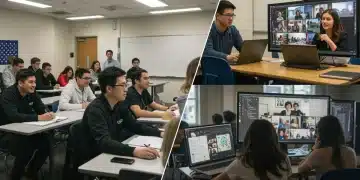Reality students to you are Indian ki America? Coming

Support systems for Indian students living abroad include university resources, peer groups, online platforms, and maintaining family connections, all of which are vital for academic success and emotional well-being.
Reality students to you are Indian ki America? This question resonates with many who are curious about the experiences of Indian students in the United States. From navigating cultural nuances to seeking academic success, their journey is full of challenges and opportunities that deserve exploration.
Understanding the reality of Indian students in America
Understanding the experiences of Indian students in America involves navigating a blend of cultural adjustments, academic challenges, and personal growth. Many students often enter the U.S. with high hopes and aspirations, yet soon face the reality of adaptation.
Cultural Adjustments
The transition to life in America is not always smooth. Indian students typically encounter a variety of cultural differences, which can be startling. For example, they might notice differing social norms, communication styles, and even food preferences. Adjusting to this new environment requires patience and openness.
Common Challenges Faced
- Language Barriers: Although many Indian students are proficient in English, navigating colloquial terms and slang can be daunting.
- Homesickness: Being away from family and friends can lead to feelings of loneliness.
- Academic Pressure: The expectations in American universities are often higher, requiring students to adapt their study habits.
Alongside these challenges, Indian students also experience significant opportunities for growth. Many find new passions they never knew they had, form lifelong friendships, and gain valuable life skills. The exposure to diverse perspectives enhances their global outlook.
As they proceed with their studies, Indian students often engage in community activities or groups related to their culture. These platforms allow them to connect with fellow students facing similar challenges, offering a sense of belonging. It’s crucial for them to seek support and foster these connections.
Gaining Academic Success
Success in academia is a common goal for many international students. They often benefit from mentorship programs, tutoring, and academic resources provided by their universities. Leveraging these tools can significantly ease their educational journey.
In summary, understanding the reality of Indian students in America reveals a landscape filled with both formidable challenges and remarkable opportunities. Their experiences can be incredibly enriching, leading to personal and professional growth that lasts a lifetime.
Cultural adjustments faced by Indian students

Cultural adjustments faced by Indian students in America can be quite significant. Moving to a new country often means adapting to different customs, behaviors, and lifestyles. These changes can be both exciting and overwhelming.
Adapting to Social Norms
Social interactions in the U.S. may differ from what Indian students are used to. For instance, greetings can vary greatly, and the casual nature of conversations can be surprising. Understanding the importance of personal space and different communication styles is key.
Food and Dietary Changes
Food is a huge part of culture, and many Indian students face challenges when it comes to finding familiar meals. Adjusting to American cuisines might involve trying new ingredients and recipes. Having access to Indian grocery stores or community groups can help ease this transition.
- Availability of Groceries: Finding common spices and ingredients.
- Eating Out: Navigating menu options at restaurants.
- Cooking Skills: Learning to prepare local dishes.
Additionally, students often miss the comfort foods from home which can lead to feelings of nostalgia. Sharing meals with friends, both from India and other cultures,allows for cultural exchange and enhances social bonding.
Besides food, students may need to adjust to various cultural events and celebrations. Students might experience holidays differently, participating in local festivities while also finding ways to celebrate their own traditions. This balance can help create a rich, multicultural experience in their academic journey.
Academic Adjustments
The educational system in the U.S. sometimes differs in structure and expectations. Indian students might find the emphasis on participation and group work to be a change from their usual experience. Engaging in discussions and presenting ideas openly becomes crucial for success.
While these adjustments can be challenging, they also enhance personal growth and strengthen resilience. Building friendships and connecting with peers from different backgrounds enriches their understanding of diversity.
Career opportunities for Indian students in the U.S.
Career opportunities for Indian students in the U.S. are vast and diverse. Many students choose to pursue degrees that align with high-demand sectors, such as technology, engineering, and healthcare. The U.S. job market is known for its innovation and growth, making it an attractive destination for international students.
Industries with High Demand
Several industries actively seek skilled graduates from Indian universities. These industries include:
- Technology: Companies continuously look for talent in software development, data analysis, and cybersecurity.
- Healthcare: With a growing need for healthcare professionals, Indian students can pursue careers in nursing and medical research.
- Engineering: Fields like civil, mechanical, and electrical engineering offer numerous positions due to ongoing infrastructure projects.
The demand for skilled professionals allows Indian students to find internships that often lead to full-time positions. Many universities offer career fairs and networking events, connecting students with potential employers. Engaging in these events is crucial, as they provide insights and build professional relationships.
Internships and Practical Experience
Internships play an important role in securing a job after graduation. They provide valuable work experience and help students apply their classroom knowledge to real-world scenarios. Many companies offer avenues for applying for internships, which can be rewarding both financially and in terms of experience.
Moreover, obtaining an internship not only enhances a student’s resume but also strengthens their skill set. Many companies prefer candidates who have practical experience in their field. As a result, students should consider relevant internships during their studies.
Networking and Professional Growth
Networking is vital for career development. Indian students are encouraged to build connections through professional organizations, university resources, and online platforms like LinkedIn. These connections can provide guidance and open doors to job opportunities that might not be widely advertised.
Additionally, attending workshops and seminars can further enhance skills and knowledge. Many alumni networks are instrumental in guiding current students on their career paths.
In conclusion, Indian students in the U.S. have a wealth of career opportunities available. By taking proactive steps such as pursuing internships, networking, and focusing on skills development, they can position themselves for success in the competitive job market.
Support systems for Indian students living abroad

Support systems for Indian students living abroad are crucial for their success and well-being. Moving to a new country can be challenging, and having the right resources helps ease the transition.
University Support Services
Many universities offer specialized support services for international students. These can include:
- Advising Centers: These centers provide guidance on academic issues and cultural adaptation.
- Counseling Services: Access to mental health services helps students cope with stress and homesickness.
- International Student Offices: These offices assist with visa issues and legal documentation.
Having these resources available allows students to focus more on their studies and make the most of their experience abroad. Friendly staff members at these centers often create a welcoming environment that encourages students to seek assistance when needed.
Peer Support Groups
Connecting with fellow students is essential for emotional support. Many Indian student associations exist on campuses to help students form friendships and support networks. These groups often organize events, cultural celebrations, and study sessions, allowing students to stay connected with their roots.
Joining such organizations can ease feelings of loneliness and provide a sense of belonging. Engaging in these communities encourages positive interactions and makes the international student experience more enjoyable.
Online Resources and Communities
Numerous online platforms and forums also offer support and guidance for Indian students abroad. Websites and social media groups provide a space for students to share experiences, ask questions, and offer advice. These platforms can be incredibly helpful for exchanging information on life in the U.S., from housing options to tips for succeeding academically.
Moreover, attending webinars hosted by professionals provides students with valuable insights into career opportunities and personal development. Staying informed through these online resources helps students feel more empowered and confident in their journey.
Family and Friends Back Home
Lastly, staying connected with family and friends back home is vital. Regular communication can reduce feelings of isolation and homesickness. Technology makes it easier than ever to maintain these relationships. Video calls, social media, and messaging apps help bridge the distance and keep students feeling supported.
Having a strong support system in place significantly enhances the overall experience for Indian students living abroad. Access to resources, building connections, and maintaining relationships contribute to a successful academic journey and personal growth.
In conclusion, Indian students living abroad face both challenges and opportunities as they navigate their new environments. Having strong support systems is essential for their success and well-being. From university services to peer groups, these resources help students adjust and thrive. Building relationships and staying connected with family back home also play a crucial role in reducing feelings of loneliness. Ultimately, embracing these support systems enhances their educational experience and personal growth while living in a different culture.
FAQ – Frequently Asked Questions about Support Systems for Indian Students Living Abroad
What resources do universities provide for international students?
Universities offer advising centers, counseling services, and international student offices that help with academic and legal support.
How can peer support groups help Indian students?
Peer support groups provide a sense of community, help in making friends, and offer a space to share experiences and challenges.
What are the benefits of online resources for students?
Online resources including forums and social media platforms allow students to connect, share information, and access guidance from others in similar situations.
How important is staying connected with family?
Staying connected with family reduces feelings of loneliness and homesickness, providing emotional support while studying abroad.





